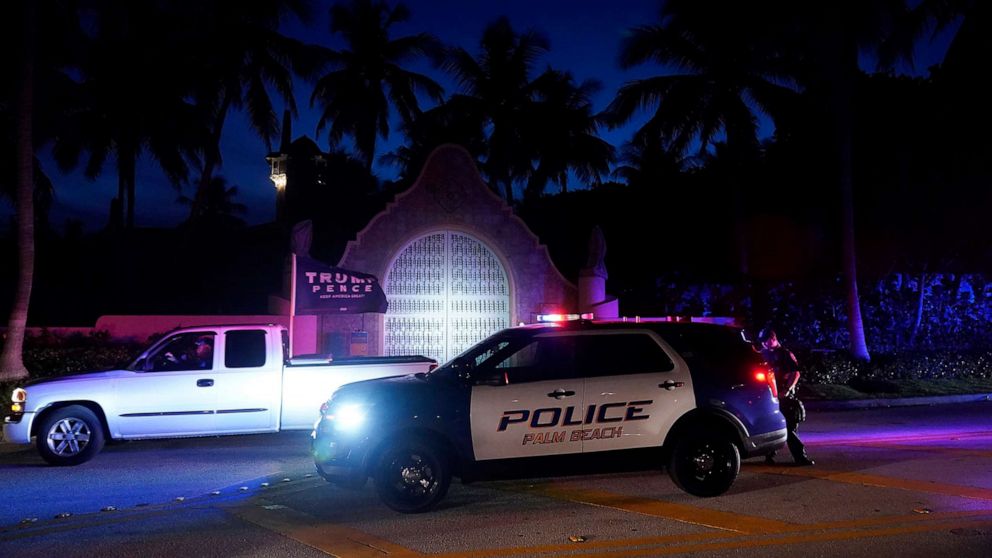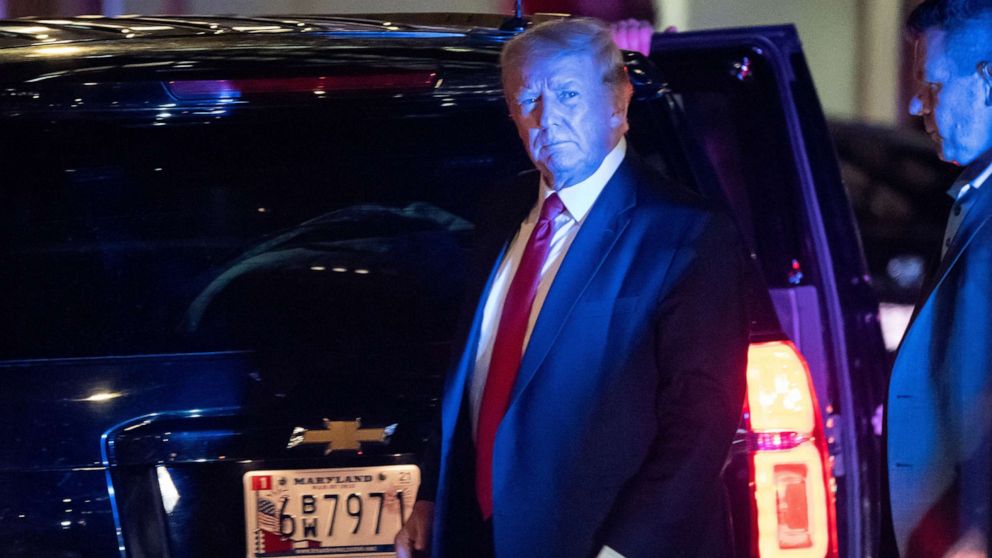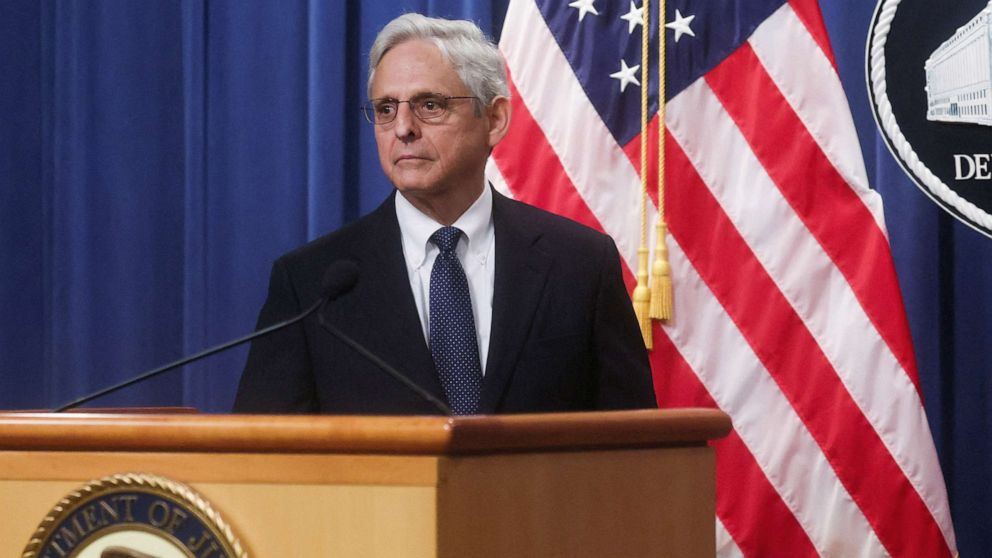A redacted copy of the warrant and related papers from the FBI’s search of Donald Trump’s Mar-a-Lago indicates that the Justice Department is investigating the potential violation of at least three separate criminal statutes, including under the Espionage Act.
The filing — released Friday by the court, at the government’s request and with Trump’s agreement — includes the warrant, two attachments (“Attachment A” and “Attachment B”) and an inventory of what was taken from Mar-a-Lago during the FBI operation on Monday in Palm Beach, Florida.
Attachment B states that the property to be seized by agents includes “all physical documents and records constituting evidence, contraband, fruits of crime or other items illegally possessed” in violation of 18 USC 793, a statute under the Espionage Act involving the gathering, transmitting or loss of defense information; 18 USC 2071, which involves any federal government employee who willfully and unlawfully conceals, removes, mutilates, obliterates, falsifies or destroys public records; and 18 USC 1519, obstruction of justice.
Under the receipt, showing property that was seized from Trump’s estate, agents note they recovered 11 sets of documents of various classifications ranging from confidential to top secret (TS) and sensitive compartmented information (SCI).
The receipt identifies one set referring to “various classified/TS/SCI documents,” four sets of top secret documents, three sets of secret documents and three sets of documents described as confidential.
Other materials included in the receipt are an item labeled “Info re: President of France,” an executive grant of clemency for Trump ally Roger Stone, binders of photos, a “potential presidential record” and a leather-bound box of documents.
It appears that there were 27 boxes taken.
The Washington Post previously reported that classified documents related to nuclear weapons were among the items agents sought by the federal agents at Mar-a-Lago.
Sources previously had told ABC News that the search was in connection to documents that Trump took with him when he departed Washington, including some records the National Archives said were marked classified.
In a statement on Friday, Trump spokesman Taylor Budowich contended that the documents were declassified and played down the items that were taken as “the President’s picture books” and “a ‘hand written note.”

A supporter of former President Donald Trump drives past his Mar-a-Lago estate, Aug. 8, 2022, in Palm Beach, Fla.
Wilfredo Lee/AP
“This raid of President Trump’s home was not just unprecedented, but unnecessary—and now they are leaking lies and innuendos to try to explain away the weaponization of government against their dominant political opponent. This is outrageous,” Budowich said.
Whether or not the materials taken by the government were classified may not matter for two of the criminal statutes cited in the warrant, according to ABC News chief legal analyst Dan Abrams.
“As I look at these statutes, I’m focused less on the question that the Trump team has been talking about, which is the classification of the documents — which is obviously very important in a macro picture — but in a strictly legal sense, [for] two of these three statutes, that may not even be the critical question,” Abrams told ABC’s David Muir in a special report on Friday following the release of the search warrant.
One of the statutes, 18 USC 1519, relates to the destruction, alteration or falsification of records.
“That is the statue I am singularly most interested in here,” Abrams said.
The other, 18 USC 793, a statute under the Espionage Act that involves the gathering, transmitting or loss of defense information, also doesn’t specifically relate to classified information, Abrams said.
“It can relate to anything related to the national defense,” he said. “That could be a very serious felony there.”
The release of the search warrant papers comes after a daylong back-and-forth between Trump and the Department of Justice.

Former President Donald Trump arrives at Trump Tower in New York City, the day after FBI agents raided his Mar-a-Lago Palm Beach home, Aug. 9, 2022.
David Dee Delgado/Reuters
On Thursday afternoon, Attorney General Merrick Garland spoke for the first time about Monday’s search and revealed that he personally authorized the decision to seek a search warrant, which drew intense criticism from Republicans as a partisan attack on Trump.
In his speech, which lasted less than five minutes, Garland defended the integrity of federal law enforcement and, without commenting on any specifics related to the Trump investigation, said: “Faithful adherence to the rule of law is the bedrock principle of the Justice Department and of our democracy. Upholding the rule of law means applying the law evenly without fear or favor.”
“Under my watch, that is precisely what the Justice Department is doing,” Garland said.
He said that the Justice Department had sought to keep the search of Mar-a-Lago from public view but that Trump then disclosed it in a statement Monday night.
Citing “the substantial public interest in this matter,” Garland said the government decided to file a motion seeking to unseal the warrant.
Trump, who had been able to release the warrant earlier without the government’s motion, said on his social media platform Truth Social on Thursday night that he wanted the “the immediate release of those documents.”
On Friday, the court released the redacted versions.

U.S. Attorney General Merrick Garland arrives to speak about the FBI’s search warrant served at former President Donald Trump’s Mar-a-Lago estate in Florida during a statement at the U.S. Justice Department in Washington, D.C., Aug. 11, 2022.
Leah Millis/Reuters
Congressional Republicans have echoed Trump in criticizing the Justice Department’s investigation, which is one of multiple legal issues Trump faces. (He denies wrongdoing in each.)
Republicans on the House Intelligence Committee defended Trump on Friday while attacking the Department of Justice and FBI during a press conference on Capitol Hill.
“President Donald Trump is Joe Biden’s most likeliest political opponent in 2024 and this is less than 100 days from critical midterm elections,” Rep. Elise Stefanik, the No. 3 House Republican, said Friday. “The FBI raid of President Trump is a complete abuse and overreach of its authority.”
Stefanik vowed an investigation into the search if the GOP retakes the House in November.
“House Republicans are committed to immediate oversight, accountability and a fulsome investigation to provide needed transparency and answers to the American people,” she said.
ABC News’ Meredith Deliso and Allison Pecorin contributed to this report.

